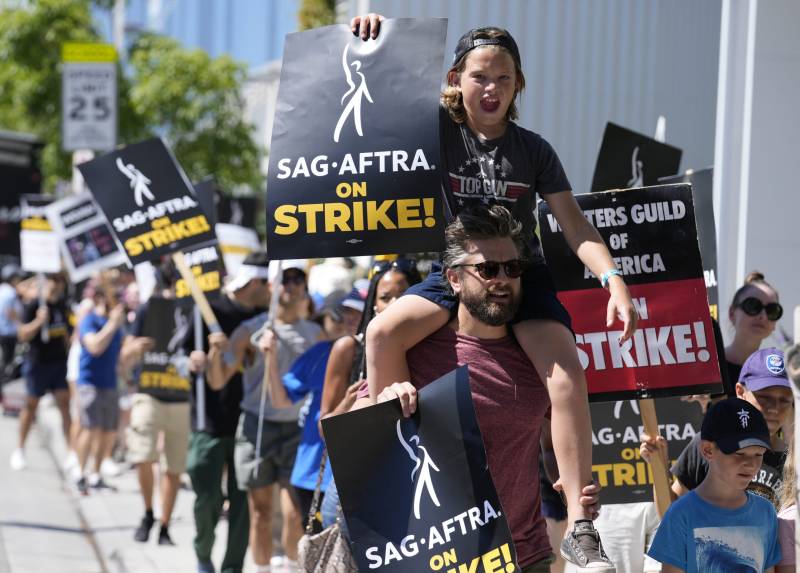
The lingering fear of new technologies taking over turns into a haunting reality as SAG-AFTRA, the writers' and actors' union in the US, has been on strike in the film and television capital of Los Angeles since August 9th of this year.
The demands of the actors and writers revolve around improved working conditions and more substantial pay cheques, while Warner Bros. Discovery bemoaned a loss of $300 to $500 million for the last quarter of 2023. With more than 100 thousand members in the writer's guild and actors' association, concerns are mounting over the increasing impact of AI technologies on their income and status in the industry. The looming question is more significant than ever before – what comes next?
Will AI replace a significant portion of creative professionals in the industry, including writers, editors, camera crews, and even actors?
Hollywood has prophesized this possibility in various productions, such as Spike Jonze's Her (2013), among others, showcasing that AI could potentially create actors too. You might have also heard of AI-generated female TV presenters in India or a TV host created by AI for a Pakistani TV channel. Fundamental questions arise from these developments concerning the absence of human sensibility in these artificial actors and writers. Simultaneously, AI's role in content creation has also sparked ethical questions regarding the authenticity of artistic expression. Many argue that AI-generated content lacks the depth and nuance that human creativity brings, often falling short in capturing the true essence of storytelling. This also raises concerns about making human resources redundant as AI infiltrates various domains. These issues lie at the core of the Writers Guild of America (WGA) strike.
Nevertheless, Warner Bros. Discovery CEO David Zaslav and others like him still rely on human expertise to run their businesses – at least for now – so they’re making efforts to find ways of ending the strike.
In the screen entertainment industry, changes go beyond the people involved in behind-the-camera roles. Platforms like Netflix and Amazon Prime have transformed how audiences traditionally consume films and TV shows. Home environments, where online streaming content is consumed, offer more privacy compared to cinemas and thus entail fewer worries about censorship – meaning more profits for the film and TV show producing companies. While watching a blockbuster at home may lack the collective experience of theatrical spectatorship, these debates are of more interest to scholars than to Hollywood producers like David Zaslav. The film world CEOs are more concerned with calculating their annual profits than losing sleep over the fate of creativity or the creative individuals in the age of AI.
To better understand the current turmoil in Hollywood, we can draw parallels with the Industrial Revolution that swept through the 19th century. During this period, the introduction of machinery drastically altered the labour and production landscape. While it brought unprecedented economic growth and technological advancement, it also led to significant social and economic disparities. One of the most significant shifts during the Industrial Revolution was the replacement of manual labour with machines. As factories became more mechanized, skilled craftsmen and artisans often lost work to more efficient and cost-effective machinery. This shift in labour dynamics gave rise to labour movements and protests similar to the WGA strike.
Much like the writers in Hollywood today, workers during the Industrial Revolution faced poor working conditions and reduced wages. The advent of machines meant that many labourers were replaced by unfeeling mechanisms, leading to widespread job insecurity and wage stagnation. Workers protested against these harsh conditions, demanding fair wages, better working conditions, and job security. Similarly, in Hollywood, the rise of AI in content creation and other departments has led to a reduction in opportunities and income for writers. Whilst Hollywood producers and their global counterparts may harbour their own perspectives on this matter, there are those among us who ardently embrace the confluence of change and technology.
Change is inevitable, evolution cannot be curbed
One can argue that the writers and artists need to break their shells and try to adapt to the changing world. While resistance is often fuelled by legitimate concerns, it can also hinder progress and economic growth. Therefore, finding a balance between preserving the integrity of an industry and embracing technological advancements is the key challenge. The WGA strike in Hollywood is not just a labour dispute; it is a reflection of a rapidly changing industry grappling with the advent of artificial intelligence.
As we move further into the digital age, the entertainment industry, like many others, will continue to grapple with the integration of AI and its implications for workers and creativity. It is crucial for stakeholders to engage in thoughtful dialogue to strike a balance between harnessing the benefits of AI while preserving the unique qualities of human creativity. The WGA strike serves as a poignant reminder that the intersection of technology and creativity is an ongoing journey filled with challenges and opportunities, much like the industrial transformations of the past.
Indeed, this evolution did not transpire overnight.
In the Indian subcontinent, the prescient work of Satyajit Ray, encapsulated in his short narrative "Anukul," scribed decades past and subsequently transmuted into a short cinematic production by Sujoy Ghosh in 2017, depicts the quandary when an automaton is hired as a domestic attendant. Such speculative portrayals were once facilely relegated to the realm of science fiction, but now, they materialize as palpable actualities. As this phenomenon burgeons and engulfs a multitude of laborers across diverse domains worldwide, including the creative and entertainment industries, it beckons us to ponder an overarching question: while AI burgeoned, to what extent did the education system prepare individuals to grapple with it?
One should not labour under the delusion that the crisis will abate once the Hollywood strike subsides. The die is cast, and the influential titans shall determine the course of events.

